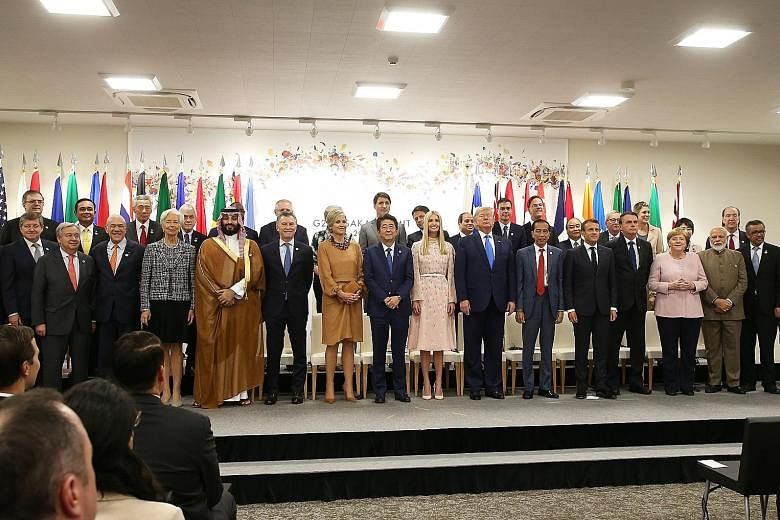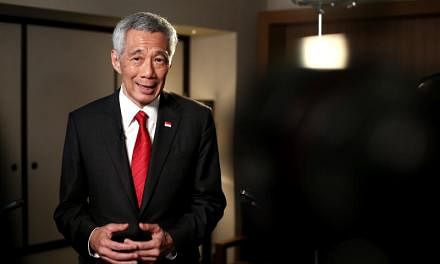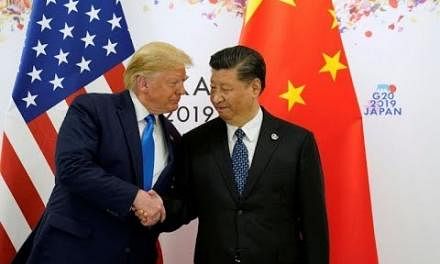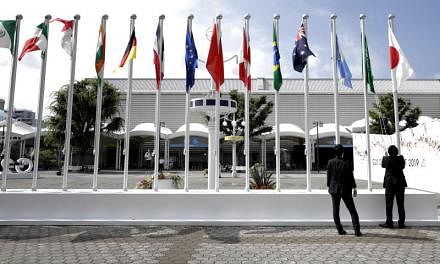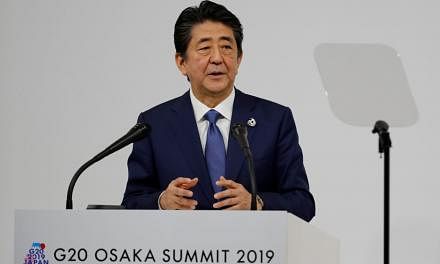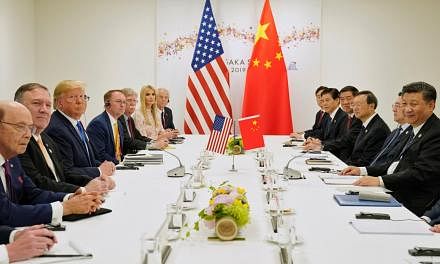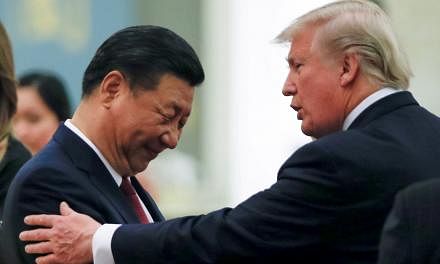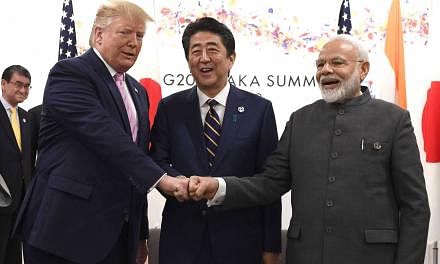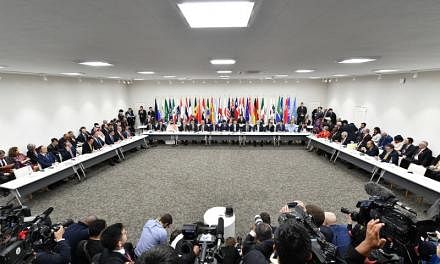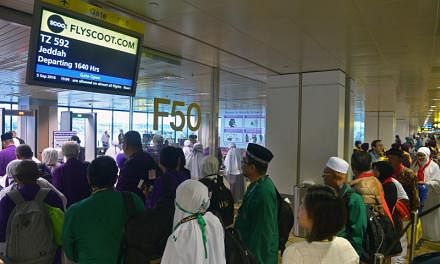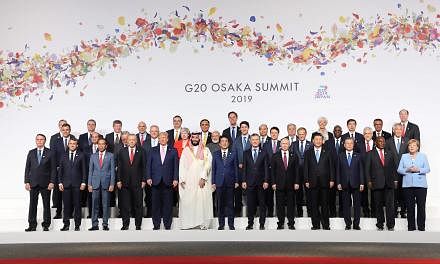Group of 20 leaders agreed to disagree in their joint declaration yesterday, in a sign of little headway on the key issues.
Leaders including Japanese Prime Minister Shinzo Abe and French President Emmanuel Macron admitted the talks had been challenging.
Mr Abe, who emphasised it was his top priority to shepherd the bloc to a consensus by finding common ground despite their differences, told a news conference yesterday: "People tend to highlight the differences in views, which are emphasised and then politicised."
He added: "What is important is to deliver an outcome focused on common goals, based on an agreed notion rather than confrontation."
Still, Singapore Prime Minister Lee Hsien Loong told Singapore reporters that the communique, issued at the close of the two-day summit yesterday, amounted to a "form of words which everybody was comfortable with, and is a description of where we are today".
"It is positive that they were able to agree on a form of words. I think that it is still worrying that we are not able to make significant forward progress," he said.
"I do not believe that in this discussion for the G-20, a great deal of forward movement has taken place on the core issues," he said, referring to such issues as global trade and climate change.
-
TRADE WAR TIMELINE
-
2018
March 22: The US announces 25 per cent tariffs on US$50 billion (S$67.7 billion) worth of Chinese imports, particularly electronics.
April 2: China imposes tariffs on US$3 billion worth of US products, in response to earlier US levies on steel and aluminium. China also draws up its own 25 per cent tariffs on US$50 billion worth of American imports.
July 6: US and Chinese tariffs of 25 per cent on US$34 billion worth of each other's goods go into effect.
Aug 23: A second tranche of 25 per cent tariffs on US$16 billion worth of each other's goods go into effect.
Sept 17: The US announces it will impose new tariffs of 10 per cent on another US$200 billion in Chinese goods. Sept 24: China announces 10 per cent retaliatory tariffs on US$60 billion in US goods.
Sept 24: The tariffs of 10 per cent go into effect.
Dec 1: US President Donald Trump and Chinese President Xi Jinping agree on a truce. Mr Trump delays hike of 10 per cent tariffs to 25 per cent on US$200 billion of Chinese goods until March 1.
2019
Feb 24: Mr Trump postpones the March 1 tariff hike indefinitely, citing progress in trade talks.
May 5: Mr Trump says the 10 per cent tariffs on US$200 billion worth of Chinese goods will be raised to 25 per cent on May 10. He threatens 25 per cent tariffs on another US$325 billion worth of Chinese goods.
May 10: Tariffs on US$200 billion in Chinese goods increased to 25 per cent.
June 1: China hikes duties to 25 per cent on US$60 billion worth of US goods.
June 6: Mr Trump threatens to slap tariffs on the remaining untaxed Chinese imports worth US$300 billion estimated by his trade office.
June 29: Mr Trump meets Mr Xi at the G-20 Summit and says US will not impose any new tariffs on China for now.
On trade, Russian President Vladimir Putin said there were "no breakthrough decisions" though leaders agreed on their "common aspiration to work further on improving the global trade system".
During the summit, leaders were split over how to proceed with World Trade Organisation reform and how to uphold free trade.
Like the Buenos Aires summit statement six months ago, yesterday's declaration dropped the signature pledge against protectionism under pressure from the US.
Instead, the leaders made a vow to "strive to realise a free, fair, non-discriminatory, transparent, predictable and stable trade and investment environment, and to keep our markets open".
They also warned of challenges including low global economic growth, downside risks, and "intensified" trade and geopolitical tensions, adding: "We will continue to address these risks, and stand ready to take further action."
Climate change also proved to be another contentious issue, with US President Donald Trump having decided to jettison the marquee 2015 Paris agreement in which nations agreed to halt the rise in temperatures to "well below" 2 deg C or even 1.5 degrees, if possible. The leaders yesterday repeated the so-called "19+1" model that surfaced at the Argentina summit, with the US the lone standout.
The Osaka declaration said the countries which had confirmed the Paris Agreement's "irreversibility" in Buenos Aires remain committed to fully implementing the deal.
But the leaders yesterday also acknowledged that there are "common but differentiated responsibilities and respective capabilities, in the light of different national circumstances."
The US position on the Paris deal was again enshrined in a separate clause, which read: "The US reiterates its decision to withdraw from the Paris Agreement because it disadvantages American workers and taxpayers.
"The US reaffirms its strong commitment to promoting economic growth, energy security and access, and environmental protection."
Much attention had been paid on whether Mr Trump, who has questioned the science that shows climate change is a real threat, would succeed in his gambit to weaken the G-20 declaration even further by enlisting fellow sceptics like Brazilian President Jair Bolsonaro and Australian Prime Minister Scott Morrison.
Mr Bolsonaro told reporters yesterday that he had raised his concerns about "environmental psychosis" with German Chancellor Angela Merkel and French President Emmanuel Macron. He said: "Environmental psychosis is when someone thinks the environment should be above all the rest."
Mr Abe admitted that climate change was a hot potato during the summit, though he stressed that everyone was on the same page in "the goal of handing over a better planet to the next generation".
Mr Macron, who had thrown down the gauntlet and said he will refuse to sign a declaration without any mention of the Paris deal, said: "We avoided going backwards, but we must go much further."
SEE WORLD
